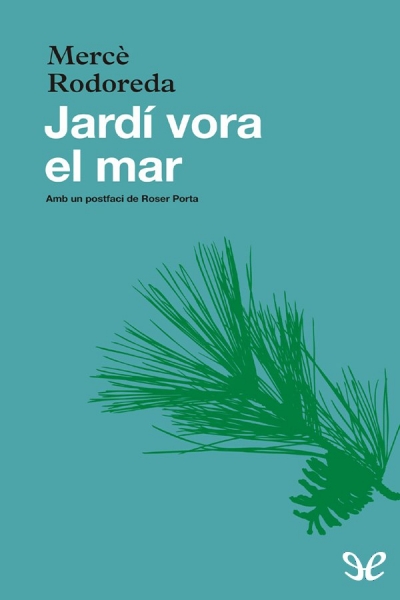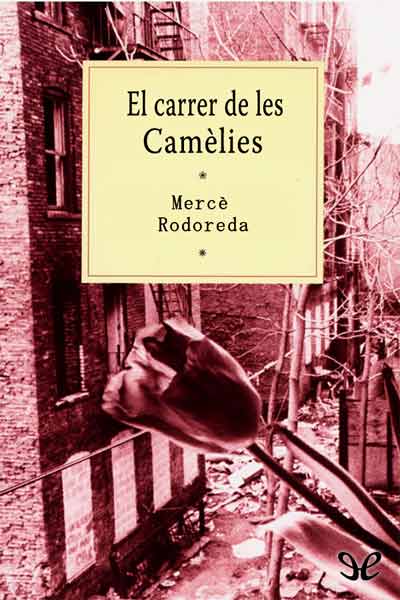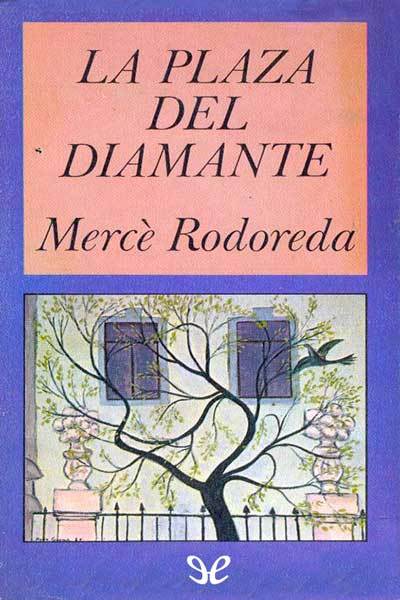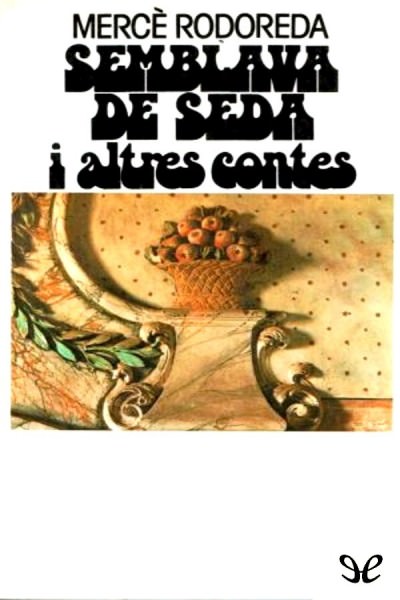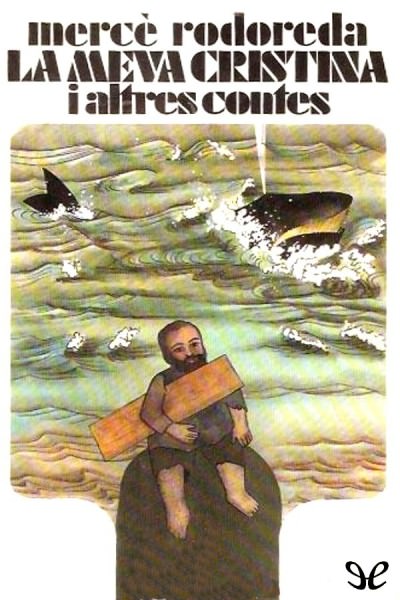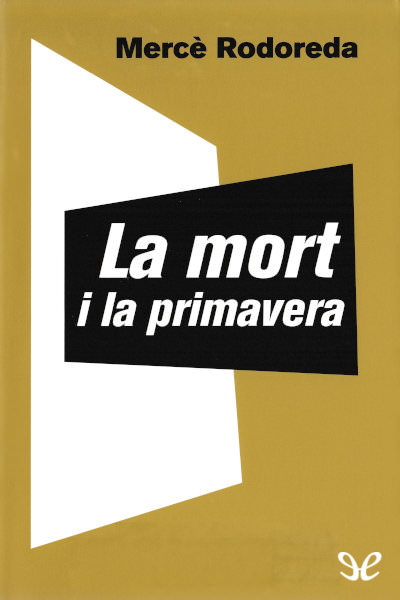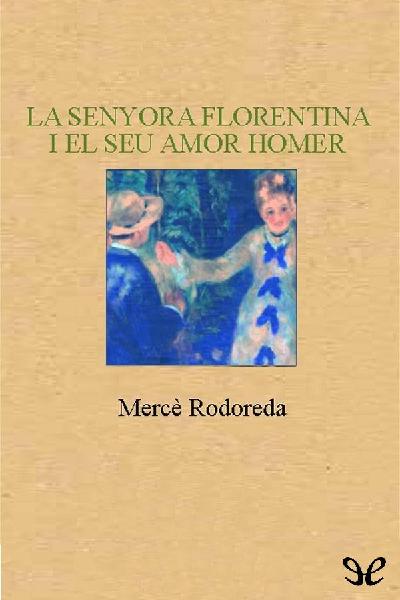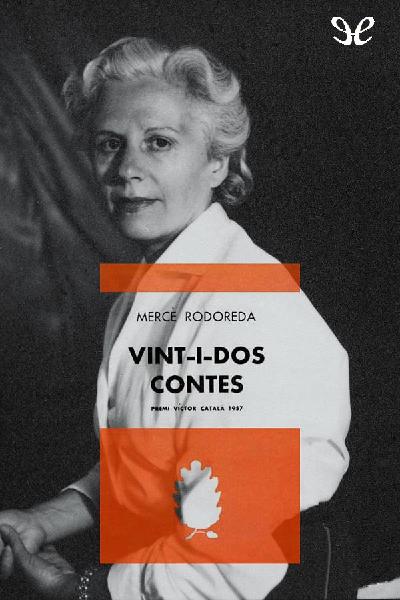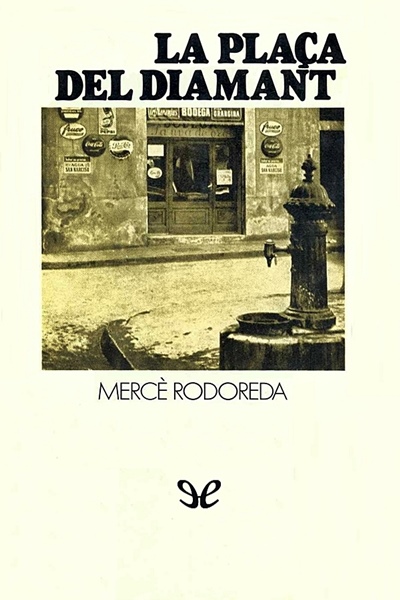oleebook.com
Quanta, quanta guerra de Mercè Rodoreda
de Mercè Rodoreda - Género: Drama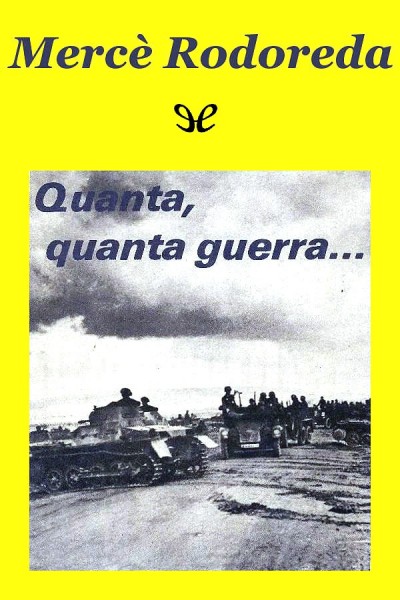
Sinopsis
Adrià Guinart té quinze anys quan fuig de casa per anar a la guerra. Però la guerra lescup. Sense arribar a fer el soldat, el seu camí per pobles i selves, de la riba del mar a la vora dun riu, és sembrat de gent estranya. Córrer món en el desordre de la guerra: tal és la condició dAdrià Guinart, potser el personatge més tendre que va crear Rodoreda.
Mercè Rodoreda sap transformar en un doll esbojarrat de poesia lerrabundeig incoherent del jove voluntari i desertor Adrià Guinart, sempre movent-se entre la follia i el somieig a través duna terra devastada per un gran combat (certs indicis, com ara el riu ample i tèrbol, els cims escapçats pels obusos, la mortaldat esgarrifosa, fan pensar en la batalla de lEbre). Es tracta duna poesia estranya, molt estranya, que en una primera lectura precipitada pot desconcertar el lector; una segona lectura més atenta li farà veure que a moments, sobretot cap al final, és descendent ben legítima de lApocalipsi de sant Joan. I és que la guerra que Mercè Rodoreda ens evoca, més enllà de la que visqué amb tota la seva generació i que havia de deixar Catalunya dessagnada per molts anys, és la de sempre; és el segon genet del vident de Patmos, el del cavall vermell («blanc esquitxat de sang» diu Mercè Rodoreda), un dels quatre que assoten la humanitat pecadora des de lalbada del món. Poema en prosa duna inspiració exaltada fins al paroxisme, Quanta, quanta guerra
es clou amb accents desperança, com un eco certament de lApocalipsi però també de lEvangeli que es fes sentir, consolador, sobre els camps de batalla que tanta sang ha assaonat.
Libros Recomendados - Relacionados
Reseñas Varias sobre este libro
War, Not Much War.
The War in this book is there, but it doesn't take center stage. Instead, it provides a backdrop and an excuse for commentary and tension. While I found the scenarios making up the wild and inventive vignettes of this novel intriguing and beautifully composed, they were so disconnected and random at times, that my interest wavered. It was only possible to get a sense of place and time when the protagonist was not in the midst of surreal cruelty and all-too-human suffering. Indifference, pathos, wandering, those seemed to be the prevailing moods.
It is certainly important and riveting in sections, but I wonder if the author's other works might follow more memorable modes of storytelling. Perhaps after multiple readings this book would sink in more, but I have to dig around to grasp at any of the disparate images left in my mind after reading it. For instance, when the protagonist explains the significance of their own shadow, blows it out of proportion, acquires a phobia of it, and then retreats back into self-contemplation, I am not sure I understand the significance of the interlude. There are many such unique musings to be found among the playful tricks of children and the unexplainable weirdness to be found here, all of which contains traces of Marquez, Kafka, and Kobo Abe. We are players in a game, the rules of which we do not fully understand, Rodoreda seems to say.
This is certainly a colorful and somber novel, quick to finish but not easy to encapsulate or explain. I am left with mixed impressions, and a desire to check out her other works.2019 4-star catalan ...more16 s jeremy1,152 273
even if we win this war it'll be as though we've lost it, the way a war is set up, everyone loses. published a few years before she passed away in 1980 of liver cancer, mercè rodoreda's war, so much war (quanta, quanta guerra...) is a picaresque bildungsroman of great sorrow. set in catalonia, the author's home region, war, so much war follows young adrià and his itinerant wanderings through war-scarred towns, villages, and countryside, encountering a surfeit of horrors tempered by the occasional kindness.
some kind of animal drew near me. i turned over with a moan. the animal didn't budge. i stretched out my arm to touch it and felt an icy hand: i was lying next to a dead soldier. my bones ached, but i made an effort to overcome the pain and attempted to roll farther down the bank. the reeds stopped me. it was drizzling. i was starting to fall asleep, i couldn't understand why everything that was good in this world had abandoned me. the brutality of adrià's experiences, despite being mostly removed from the actual fighting itself, convey the torments and forced indifferences of war quite well, and with her evocative and unabashed imagery, rodoreda lays bare the wasteland that is war all the while foregoing even a whiff of moralizing. with fantastical elements interplaying with the abundant barbarity and atrocities aplenty, war, so much war paints a stark picture of a conflict destined to conclude with, indeed, everyone losing. war is hell, as the old saying goes, yet rodoreda is able to amply portray the pockets of beauty, hope, and generosity which thrive amidst scenes otherwise dominated by bloodshed and belligerence.
i would return bearing mountains of memories of all the people i had met, people who had been born and had lived so that i might know them, and they would accompany me for the rest of my journey... so many sweet eyes, so many sad eyes, so many surprised eyes, so many desperate eyes... would the remembrance of evil dissipate or would i carry it with me always, a malady of the soul?
*translated from the catalan by maruxa relaño (imma monsó) and martha tennent (rodoreda's death in spring and the selected stories)fiction translation9 s Víctor Juan abelló165 9
Un llibre estrany, en un context de guerra però on la guerra no hi apareix, només els seus efectes indirectes, un mosaic d'històries i personatges cosits per un Adrià que és més observador que personatge protagonista, i una aura de màgia, de màgia negra que sovint recorda els ambients de La mort i la primavera. Rodoreda és una de les millors escriptores de la literatura catalana i ho demostra amb obres inclassificables com aquesta.6 s Tiago Aires322 32
"a única coisa que tenho é a minha vida. Se a conto foge, perco-a." (p.198)
E, ainda assim, Adrià Guinart conta-nos um pouco da sua vida. E um pouco das muitas vidas que lhe são contadas enquanto caminha pelo mundo - um mundo devastado pela guerra (Civil Espanhola), mas onde há ainda espaço e tempo para o amor, a amizade, a solidariedade, a natureza e espanto das coisas novas. Poético, triste por vezes, crítico também. Gostei muito da escrita poética, da narração com elementos meio fantásticos de pendor medievalizante...
Segue-se "A Morte e a Primavera", o segundo que lerei dela. Estavam guardados na estante, à espera de vez. Posso agradecer a "A velocidade da luz" de Javier Cercas, onde a autora é referida, por me ter "lembrado" dela!
"Teria de falar do sol, mas tenho de terminar este prólogo depressa e não sei escrever com pressa." (p.17)4 s Paula Mota1,196 381 Read
DNF.
Demasiado onírico e desconexo para mim.4 s Emma72 4
Potser dels meus preferits. Gairebé un recull de contes, però amb un fil conductor: els ulls de l'Adrià. Diu que vol "veure cel, veure boscos, tenir por, mirar la nit i tenir-la per sostre". Un llibre molt precís en la seva narració, però deixant sempre espai per a la poesia. Jaume Coll Mariné al postfaci el descriu com "el relat de la guerra a partir d'algú que no hi anava a fer res, a la guerra" i, més endavant, "el món en moviment a través d'uns ulls que tot just el [comencen] a descobrir".
A la pàgina 38: "En cada home hi ha arrels profundes que el lliguen a la gran simfonia del món..." Aquest llibre és una simfonia de la guerra i de tot allò que és humà. 3 s Mer12 4 Read
No sé què dir perquè no mha agradat gaire. Bastant avorrit i tampoc lhe entès del tot. A little decepcionada perquè mencanta na Mercè Rodoreda però aquest llibre meh, not the best.3 s Tuck2,248 237
here is a nice re-cap by a first time rodoreda reader https://www.goodreads.com/book/show/2...
rodoreda sends a young man to war and he wanders away from the 'front' and records his journey, his starving, horror filled journey away, and people he meets, kind and cruel. towards the end he decides to just keep wandering and never 'go home' though all signs tell him, go home go home.
has nebulous but based-on-fact scenes from spanish civil war, the real last battle being the epitome of waste, horror, and fruitlessness in her novel. which it pretty much was... http://spanish-civil-war.org/ebro.shtml
and also, rodoreda seems to have horned in on pla's 'novel/autobio' of catalonian coast set in same war time , with her portrait of our boy being taken in by rich, haunted man into his sumptuous two story home on the short. The Gray Notebook
this rodoreda, as dreamy, surreal, and disturbing as it is, seems more 'realist' and character driven than her other open letter novel Death in Spring which really has a hard time keeping any grasp at all on reality. i love love love rodoreda's constant references to human wanting to be trees, or actually turning into trees, and her other uses of trees in her fiction. i was to be her when i grow up. europa ill oh-loyd-i-wanna-be-hearkbroken ...more3 s Christopher AlonsoAuthor 1 book280
Okay, I'm a bit torn on this one. It didn't blow me away. It reminded me a lot of Silvina Ocampo if she wrote a novel. Psychological, fantastic, not sure if what's going on is actually going on. There are definitely unsettling parts and lots of talk about death. Death is kind of its own character here, in the background, there and not there until it makes itself known. I really d it, and I recommend it if you're looking for odd, storytelling with that surreal twist. 3 s Røbert69 12
Some nice writing, but it is one of those books which stumbles from one encounter to another, without them hanging together. This Alice in Wonderlnd style is not to my taste, I never really connected with the characters at all. Judging by the other , perhaps not the best introduction to Mercè Rodoreda's work, and perhaps it makes more sense in the context of having read her other work?spain world3 s Loreto Giralt Turón68 1 follower
Un dels millors llibres que he llegit aquest any. Descriu les conseqüències que té la guerra en les persones, com les canvia, tot i que no mai hagin agafat una arma. Com tota l'obra de la Rodoreda, és un text profundament trist, escrit amb gran delicadesa, que deixa poc marge per l'esperança. Encara no he trobat cap escriptor/a que ho faci millor.2 s Txe Polon509 43
Més que d'una novel·la, es tracta d'un recull de proses curtes amb un fil conductor que no és sinó aquest protagonista absent que respon al nom d'Adrià. Absent perquè en realitat la seva història encara està ha de ser contada, ell només es un conducte a través del qual els altres s'expressen i ens transmeten la seva experiència, ja que l'Adrià els lleva -amb l'apatia d'un observador desorientat- la seva propia veu, amb la qual s'acaben confonen les veus de tot un entramat de personatges que configuren un fons gris, uniforme i singular alhora. D'aquesta polifonia neix, precisament, la força d'aquesta pseudo-novel·la i gràcies a ella s'entén l'absència d'un personatge pretesament protagonista. Crec que es tracta d'una obra que sorprendrà tan els lectors de Rodoreda com els no lectors de Rodoreda, així com els lectors de novel·les i els lectors de reculls de relats. Per tant, és una obra que sorprendrà tothom que es vulgui deixar anar captivant per aquestes veus que narren des de l'aturdiment, la indolència, l'abúlia i, en definitiva, des de la desesperació que acaba desembocant en tot l'anterior. Així fins als darrers dos capítols, que són dues de les coses més ben escrites des del principi dels temps.
I per què no li poso la cinquena estrella? Doncs perquè aquella absència de protagonista que té tot el seu sentit dins l'obra no m'ha deixat acabar d'entrar-hi, fins ben bé cap al final.1-catalana 2-guerra-bèl-lica 2-psicològica ...more2 s World Literature Today1,190 352 Read
This book was featured in the Nota Benes section of the May/Aug 2016 issue of World Literature Today Magazine.
http://www.worldliteraturetoday.org/2...nota-bene2 s Carloesse229 86
Lo so. Non è questo il libro più rappresentativo di Mercé Rodoreda, ma a me piace spesso affrontare un autore o autrice che non conosco da una sua opera minore ( a detta di chi la conosce meglio altri sono i suoi capolavori). Ma questo è un ottimo libro, sarà poi così minore?
E un romanzo fatto di tante brevi storie raccontate da altrettanti narratori incontrati da un piccolo e ingenuo ragazzino che va in cerca della guerra, non per combattere, ma per girare il mondo, per vedere e per incontrare laltro da lui, e soprattutto, come in un percorso iniziatico la donna da amare che non sia sua madre. Incontrerà Eva (la prima donna), giovanissima e bellissima e come lui desiderosa di libertà. Anche questo incontro, come molti altri, ha il tono della fiaba ma si sa, anche la fiaba a volte assume la forma di un incubo: boschi da affrontare, castelli dalle molte stanze buie e disabitate, paesi e piazze vuote nel buio della notte, come in un quadro surreale, inaspettati incontri con la strega o con lorco, o con la banda di briganti ed assassini.
La guerra del titolo rimane sullo sfondo, non la si incontra che di rado , e di striscio, per quasi tutto il libro. Solo alla fine, e proprio quando la guerra è finita, il giovane Adrià si imbatte nellorrore della vera catastrofe che la guerra ha lasciato come la bava di una lumaca: rovine e morti, cadaveri straziati e mutilati di soldati e di civili. E scoprirà anche lamara verità su Eva.
Un finale che ci immerge pienamente nel gigantesco Guernica di Picasso, che indubbiamente Rodoreda ha nei suoi occhi quando scrive, e a cui si ispira ancora più che al film di Has tratto dal Manoscritto trovato a Saragozza come la stessa autrice dichiara nella sua stessa prefazione ( e più che ai libri-matrioska quali il libro di Potocki, le Mille e una Notte, il Decamerone.., mi ha fatto pensare a La Terra rossa di Hudson, il libro felice secondo Borges). Ne è un esempio lampante il fare da protagonista di uno di questi incontri finali la donna con il bambino morto in braccio che nel quadro è allestrema sinistra della tela.
Ma a sapere ben guardare vi sono altri punti di incontro, altre allusioni a quel capolavoro della pittura moderna.
Se Picasso però sceglie per descrivere tanta disperazione e tanto orrore il formato del grande affresco, Rodoreda lo riduce a una miniatura, e trasforma lurlo di Guernica in una sofferenza muta, tutta interiorizzata; ma non per questo ci stupisce di meno, lasciandoci ugualmente attoniti di fronte a tanta follia del mondo. E ci stupisce ancora la sua capacità, la sua maestria, di mescolare con tanta naturalezza sogni e realtà, la fiaba e lincubo, e di farli sfociare in un affresco dalle dimensioni così strette ma così essenziali. E soprattutto quella di porci di fronte alla tragedia e al suo orrore in tutta la sua pienezza senza il bisogno di descrivercelo nei suoi minimi dettagli.
Un libro prezioso. Per ora quattro stelle è il minimo che possa assegnare. Potrei ripensarci a freddo e concederne anche 5. Anzi, lo faccio adesso.
1 Andrea59
Pensava que era el meu moment per llegir-lo, però potser no l'ha estat. Igualment l'he gaudit i m'ha semblat molt bonic i trist, però no tant bonic ni tant trist com La mort i la primavera. Es veu que és l'últim llibre que va escriure. He intentat ser-hi mentre el llegia. El que no m'ha acabat de fer el pes és que a cada capítol es troba un personatge i tots els personatges són estranys. Potser no ho entenc perquè gràcies al cel no he viscut la guerra. Segurament sigui això. (He fet servir color vi per guixar-lo, penso que en això sí que ho he encertat).1 Andrea 288 39
M'ha fet un poc de llàstima este llibre perquè m'estava agradant molt: l'estil és fantàstic, la història és interessant, hi ha molta acció. No obstant això, cap al final del llibre, hi ha molta gordofòbia la qual em va llevar els ànims d'agarrar el llibre i llegir.
Mercè Rodoreda és fantàstica, però em costa molt llegir eixe tipus de cosa.biblioteca català1 Helena228
La mirada d'un adolescent, com a la mort i la primavera. Eva. Infern/jardí, palau.literatura-en-català repte-català-20211 Valeria5 Read
jo estava enfonsat lluny dels vostres ulls. als vostres ulls no hi havia res més repugnant que jobalasch-twitter hakusan1 Neus Nogué-Serrano35 9
Tinc la primera edició d'aquesta novel·la, però o sé si no l'havia llegida o no la recordava. El cas és que l'he (re)llegida com si fos la primera vegada. Tota la narració segueix un mateix to... fins que arriba el final.
Mercè Rodoreda és sempre un 10.1 Nat 37
Recomanable el postfaci d'Antoni Mora, qui fa un anàlisis del llibre i explica l'engany que t'acabes de llegir i que no t'esperaves. Per mi ho ha sigut, perquè volia trobar-me amb altre contingut literari.1 Joan Iglesias24 Read
Éramos un centenar de hombres, todos jóvenes, todos cansados, todos hartos.1 Patricia9
3.51 Guillem Balaguer27
8/10
No és el meu preferit de la Rodo però està bé nosenarrativa-català1 leire37 1 follower
merce rodoreda escribe sobre el dolor y sobre cosas terribles pero lo hace con sinceridad y ternura. Nunca hace espectáculo del horror. Es simplicidad y verdad1 Melissa289 124
Adrià Guinart lives in Barcelona with his mother and adopted younger sister. But at the first chance he gets he leaves his home and joins an unnamed war that is ravaging the countryside. He is only fifteen-years-old and what he sees while the war is raging forms the bulk of this bizarre and surreal narrative. The book almost reads a series of shorts stories, each of which is based on a different character that Adria meets while he is away from home at war.
There is very little fighting or war that Adria actually sees while he is roaming the countryside. He stumbles upon the after affects of the war by meeting some wretched people along the way. He meets a woman named Eva who is a millers daughter. The book reads a fantasy and sometimes the story is very disjointed and his episode with a woman named Eva is a perfect example. As he is wading in a river with her for a while he learns that she is a millers daughter. Their time together is very brief and when he parts from her he makes his way to the mill that her father owns. At the mill he is tied up and beaten by the miller and eventually escapes. He later meets up with Eva again, which second encounter seems even more random than the first. They have a brief conversation and she leaves him again.
Another strange episode that Adria experiences takes place at a farmhouse that he stumbles upon in the woods. When he first sees the owner of the house he is mercilessly beating his dog who has stolen a morsel of food. The farmer explains that there is nothing in this world that he despises more than a thief and so he unleashes his anger on the family pet. Adria stays with the farmer and his family for about two weeks doing chores for them in exchange for food and shelter. One night the farmers daughters take Adria to a hidden pantry where Adria steals a ham. When the farmer finds the ham, Adria suffers the same type of vicious beating that the dog received. At this point he is forced to leave the farmhouse and once again roam the countryside.
The randomness and lack of smooth transitions from one scene to the next give the book a dream quality. Its as if we have a front row seat to a viewing of Adrias never ending nightmare. Adria comes upon a castle whose owner has been tied up and held hostage in his own home. He then wanders off once again and finds a girl on a beach who pledges her undying loyalty to him. When he rejects her, she walks into the sea and commits suicide. While walking along the sea Adria encounters a beach house where the owner welcomes him and feeds him. He ends up staying with the man who owns the beach house, Senyor Ardevol, for weeks and when the man dies he leaves his home and his possessions to Adria.
For the second part of the book Adria meets a series of interesting characters on the road whose stories are told in greater length. Adria starts with Ardevols story and how he came to live in the beach house and how he came to see the strange image in the mirror in his foyer. Adria also meets a cat man, a hermit and a man with a never-ending appetite, all of whom have strange tales to tell. Even with the shift of focus in the book from Adria himself to the people he meets on the road, the stories in the second part of the book are just as fantastical and surreal as Adrias experiences in the first part.
I have mixed feelings about this book but I think that is due to my preference for more realistic fiction. The overall idea of the book is interesting but some of the shorter encounters of the main character, especially in the first half of the book, did not keep my attention. Has anyone else read any other books by Mercè Rodoreda? I am wondering if they are similar to this title.
1 Paola55 Read
em fa gràcia perquè és l'única novel·la que em faltava i alhora la primera després del tr. i ara penso que hauria de tornar a començar1 Tonymess465 42
I have spent the last couple of months getting through the United Kingdom based Man Booker International prize longlist, but at the same time I had one eye looking sideways at the emerging titles on the United States based Best Translated Book Award. The Man Booker International Prize announced a longlist of thirteen titles on 10 March, and trimmed the list to six on 14 April, giving avid readers five weeks to get through their list. Meanwhile the Best Translated Book Award announces a fiction longlist of twenty-five titles, they did so this year on 29 March and their shortlist consists of ten books which they announced 21 days after the longlist!!! Three weeks to get through twenty-five books, methinks not. I think a longer period between the two announcements would elicit more discussion, more reading, more sales (for example there are eight works on the longlist that I havent read and which did not make the shortlist, with a longer timeframe there is a very good chance I would have read those books, with piles of unread books stacking up around me there is a very much reduced chance that I will go out of my way and hunt these eight books down).
A couple of the books shortlisted for the Best Translated Book Award were already on my to be read pile, The Physics of Sorrow by Georgi Gospodinov (translated from the Bulgarian by Angela Rodel) and War, So Much War by Mercè Rodoreda (translated from the Catalan by Maruxa Relaño and Martha Tennent), as a result of my subscription to Open Letter books. Congratulations to them for publishing two titles that are deemed representative enough to make such a prestigious shortlist.
Mercè Rodoredas War, So Much War is set during the Spanish Civil War, however if you are after a traditional war story, or revelations from a Catalan point of view about the events of the Spanish Civil War, then I suggest you look elsewhere.
This book has forty-three chapters, each a small poignant, matter of fact vignette, written in the first person, with our narrator/protagonist being Adrià Guinart, a young boy born at midnight, in the autumn of the year, with a birthmark on his forehead no bigger than a lentil.
For my full review go to http://messybooker.blogspot.com.au/20...women-in-translation1 Núria Ribas46 8
Crec que Rodoreda a vegades és una mica difícil i necessites trobar el moment per a llegir segons quin llibre. Jo havia intentat de llegir-lo altres vegades, però no era el moment, fins la setmana passada que m'hi vaig sentir més a gust.
Hi ha trossets que costen una mica d'entendre, però tot i així és un dels llibres que més m'ha agradat de Rodoreda, perquè no hi ha tanta "foscor" com hi ha en altres relats (potser pel moment en què va estar escrit), amb un protagonista preadolescent molt tendre que decideix anar a la guerra, tot i que quan hi arriba, en fuig i es perd pel món, coneixent a diferents personatges que després van desapareixent i reapareixent. Cada capítol és com un conte, però tots segueixen el fil de la història.
El recomano si ja heu entrat en el món de Rodoreda, però no per ser el primer llibre que llegiu!!!1 Chris RobertsAuthor 1 book51
A Shrapnel Postcard, From Me to You
War me in the forever days...
Mechanized steel, cloaked in haze...
All the light we cannot see...
Is in that grenade hanging mid-air, a metal sculpture...
Twisting and turning, a conical hum...
The in-between time...runs out...
Exploding fragments and radiating pinwheel patterns...
A shrapnel postcard, from me to you...
The author as trance, a rote storyline...
Children under metal skies, skirt again, the land mine...
Chris Roberts
1 Joseph Schreiber494 142
Autor del comentario:
=================================
